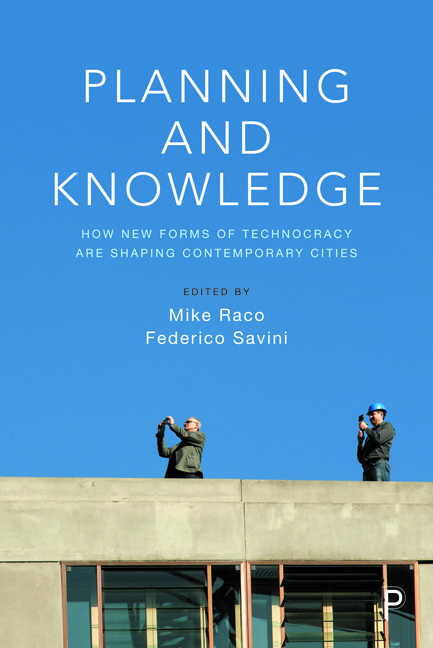Book contents
- Frontmatter
- Contents
- List of figures
- List of tables
- Notes on contributors
- Part I Conceptual framings of technocracy
- Part II Public planning and bureaucracies in contemporary urban development politics
- Part III Corporate knowledge and the land and property development sector
- Part IV Private consultants and the delivery of public policy
- Part V New constellations of actors and the management and governance of contemporary cities
- References
- Index
5 - Local government in the face of crisis: changingpublic management of urban projects inAmsterdam
Published online by Cambridge University Press: 30 April 2022
- Frontmatter
- Contents
- List of figures
- List of tables
- Notes on contributors
- Part I Conceptual framings of technocracy
- Part II Public planning and bureaucracies in contemporary urban development politics
- Part III Corporate knowledge and the land and property development sector
- Part IV Private consultants and the delivery of public policy
- Part V New constellations of actors and the management and governance of contemporary cities
- References
- Index
Summary
Introduction
To profile a better physiognomy of contemporarytechnocratic logics of planning, this chapterexplores the reform of the working processes andorganisational structures of the public managementbureaucracies in the Amsterdam municipality. It doesso in order to reflect on the mechanisms throughwhich technocratic thinking gets institutionalisedwithin existing public government bodies, and toreveal the development of public planning expertisein contemporary urban governance. As in otherchapters in this section, here we particularlyquestion the changing role of public bureaucraciesin the Netherlands, a country where public expertisestill plays a central role in urban governance, butis progressively being reformed to accommodateprivate actors.
Since the mid-1990s, political leaders and industrialelites have been celebrating the value oflarge-scale and integrated urban developmentprojects in responding to the socio-economicchallenges of cities (Healey, 2010). The tightalliances between local governments, landowners,financers and major developers that characterisethese projects have been hit hard by the globalfinancial crisis (GFC) (Enright, 2014; Savini andSalet, 2017), creating a rapid decline of demand andan oversupply of available locations for urbandevelopment. Strong austerity measures have alsoreduced the capacity and the willingness of localgovernments to provide large upfront investments ininfrastructure, public spaces or iconic buildings inmany western settings – in the recent past thesewere all important strategies to trigger privateinvestments. Recent studies on the governmentalreactions to the crisis show that public governmentshave adapted their management practices in order toaccommodate smaller scale, more ‘organic’ andpeople- oriented, demand-led practices of urbandevelopment. This change was reportedly oriented toenable investments under uncertain economiccircumstances and invite smaller investors inreal-estate projects (Savini et al, 2016; Bertoliniet al, 2011; Buitelaar, 2012; Hajer, 2011).
In the following, we show how the GFC, often perceivedby public managers as an extreme economicturbulence, has triggered a process ofreorganisation of the internal processes of publicgovernments in order to allow transitory andcontingent approaches to urban development based onthe prime goal of delivery and realisation. Urbanprojects have to be studied in relation to, and ininteraction with, a changing environment.
- Type
- Chapter
- Information
- Planning and KnowledgeHow New Forms of Technocracy Are Shaping Contemporary Cities, pp. 59 - 74Publisher: Bristol University PressPrint publication year: 2019



